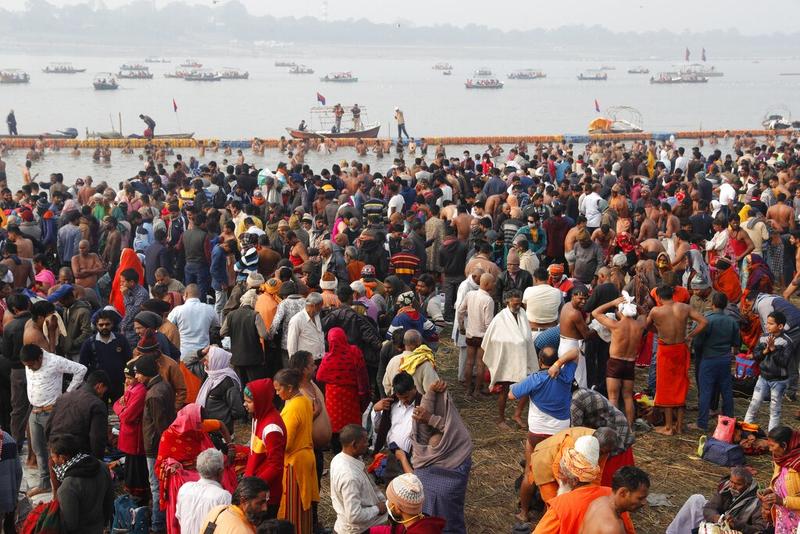 Hindu devotees crowd the Sangam, the confluence of three rivers - the Ganges, the Yamuna and the mythical Saraswati - to take a ritualistic bath during Makar Sankranti festival that falls during the annual traditional fair of Magh Mela festival, one of the most sacred pilgrimages in Hinduism, in Prayagraj, India on Jan 14, 2022. (RAJESH KUMAR SINGH / AP)
Hindu devotees crowd the Sangam, the confluence of three rivers - the Ganges, the Yamuna and the mythical Saraswati - to take a ritualistic bath during Makar Sankranti festival that falls during the annual traditional fair of Magh Mela festival, one of the most sacred pilgrimages in Hinduism, in Prayagraj, India on Jan 14, 2022. (RAJESH KUMAR SINGH / AP)
JAKARTA / ANKARA / SEOUL / YANGON / NEW DELHI / SEOUL / MANILA / TOKYO / PHNOM PENH / ULAN BATOR - Hundreds of thousands of Hindu worshippers gathered on the banks of India's Ganges river on Friday for a holy bathe despite a 30-fold rise in coronavirus cases in the past month.
Hindus believe a bathe in the holy river on the Jan 14 Makarsankranti festival washes away sins.
A large number of devotees were taking a dip in the sacred river where it flows through the eastern state of West Bengal, which is reporting the most number of cases in the country after Maharashtra state in the west.
In the northern state of Uttar Pradesh, thousands of devotees, few wearing masks, thronged the river's banks in the holy city of Prayagraj.
India is again facing a surge in coronavirus cases, fuelled mostly by the highly transmissible Omicron variant, but hospitalizations are low, with most people recovering at home.
Doctors had appealed unsuccessfully to the West Bengal state high court to reverse a decision to allow the festival this year, worrying it will become a virus "super spreader" event.
India reported 264,202 new COVID-19 cases on Friday, as the tally rose to 36,582,129 during the past 24 hours, showed the federal health ministry's latest data.
This is the second consecutive day when more than 200,000 daily cases were registered across the country in over eight months.
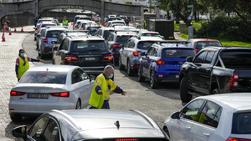 Traffic marshalls direct cars at a drive-through COVID-19 testing clinic at Bondi Beach in Sydney, Australia, on Jan 8, 2022. (MARK BAKER / FILE/ AP)
Traffic marshalls direct cars at a drive-through COVID-19 testing clinic at Bondi Beach in Sydney, Australia, on Jan 8, 2022. (MARK BAKER / FILE/ AP)
Australia
COVID-19 hospitalization rates in Australia's most populous state of New South Wales could plateau next week, a top health official said on Friday, as the state suffered record deaths from the virus for a third day.
Pressure on hospitals will likely remain for "the next few weeks", the state's health deputy secretary, Susan Pearce, said, though hospitalization numbers were tracking better than the best-case scenario in an official modelling a week ago.
"That is pleasing, but that plateauing is obviously still at a relatively high level of COVID patients in our hospitals and in our (intensive care)," Pearce told a media briefing in Sydney, the state capital.
The surge in cases fuelled by the Omicron variant has piled pressure on hospitals, which are grappling with record admissions, and on other sectors of the economy.
With staff shortages beginning to disrupt supply chains, authorities have eased quarantine rules to allow thousands of close contacts of cases to return to work in the transport and freight industries if they are asymptomatic, an extension of exemptions that had earlier applied to food production staff.
Of Australia's nearly 1.4 million infections recorded since the pandemic began, about 1.2 million have been detected over the past four weeks.
Worst-hit New South Wales reported more than 63,000 new infections on Friday, while neighbouring Victoria reported about 35,000.
Australia reported 56 deaths by mid-day on Friday, with 29 of them in New South Wales, its biggest ever COVID-19 toll.
ALSO READ: Australia's virus cases hit record high amid Omicron outbreak
Cambodia
Cambodia on Friday began providing the fourth dose of COVID-19 vaccines to priority groups in capital Phnom Penh as the Omicron variant has spread into the community.
The priority groups include leaders of the government, the Senate, the National Assembly, frontline doctors, government officials, the army and police, local authorities and the elderly, the health ministry said.
Staff of embassies and both national and international organizations as well as journalists and celebrities are also among the list to receive the fourth shots, it added.
Cambodian Prime Minister Samdech Techo Hun Sen took his fourth jab on Friday morning at his residence in southern Takhmao City and urged people to get their shots when their turns come.
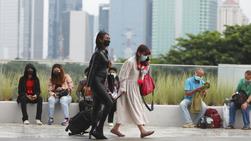 People wear face masks the help protect against the coronavirus along a skywalk in Jakarta, Indonesia on Dec 30, 2021. (ACHMAD IBRAHIM / AP)
People wear face masks the help protect against the coronavirus along a skywalk in Jakarta, Indonesia on Dec 30, 2021. (ACHMAD IBRAHIM / AP)
Indonesia
Indonesia has approved Merck & Co Inc's COVID-19 antiviral pill molnupiravir for emergency use, the country's food and drug agency said in a statemen.
A batch of 400,000 pills had arrived in Indonesia, health minister Budi Gunadi Sadikin said this week. The pill was jointly developed by US-based Merck and Ridgeback Biotherapeutics.
Meanwhile, the peak of the third wave of COVID-19 transmissions in Indonesia triggered by the Omicron variant is expected to occur in mid-February, the Health Ministry said on Thursday.
The peak will probably happen in the second or third week of February, with daily cases up to 40,000 to 55,000, spokesperson for the Health Ministry's COVID-19 vaccination program Siti Nadia Tarmizi said.
As of Monday, the country has recorded 506 cases of the Omicron variant of the coronavirus, including 84 local transmissions, as well as 1,384 probable cases of Omicron based on the S-gene target failure (SGTF) swab test method.
Thousands of probable Omicron cases are currently in the process of whole genome sequencing, Tarmizi said, adding that the daily number of COVID-19 cases in the country continues to rise with 793 new cases recorded on Thursday, which has brought the total tally to 4,268,890.
Japan
US drugmaker Pfizer Incsaid on Friday it has applied for Japanese government approval for its oral COVID-19 treatment.
The application is based on global Phase II/III trials that Japan was part of, Pfizer said in a statement.
With COVID-19 cases surging again, Japan is betting heavily on oral treatments to keep serious infections and deaths at bay.
Prime Minister Fumio Kishida said last week he aimed to distribute the Pfizer pills next month after securing 2 million doses during a December call with Chief Executive Albert Bourla.
Mongolia
The Omicron cases currently account for nearly 70 percent of new daily infections in Mongolia, the National Center for Communicable Diseases said Friday.
The Asian country reported its first imported and local Omicron cases last week, which indicates the beginning of a fourth wave of the pandemic in the country, health authorities said, urging the public to follow all relevant health guidelines.
In the last 24 hours, Mongolia registered 2,010 new cases, including 25 imported ones, raising the national count to 403,771, according to the health ministry.
Meanwhile, three more COVID-19 patients, all aged over 60, died in the past day, taking the death toll to 2,009.
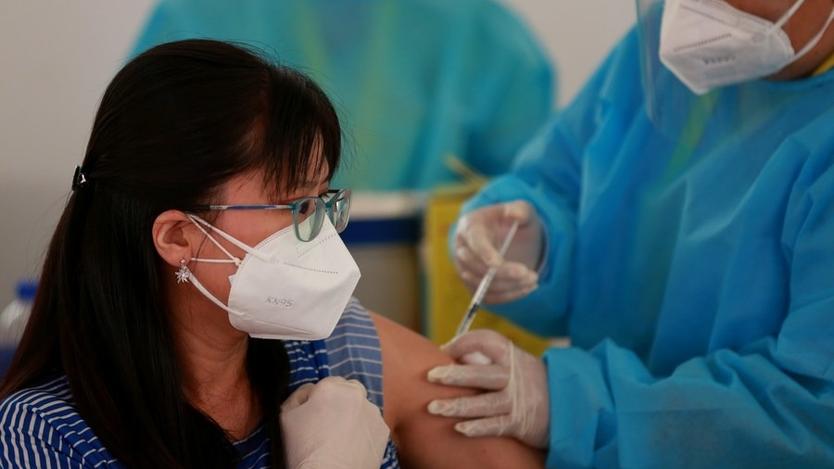 A woman receives a shot of China's Sinopharm COVID-19 vaccine in Yangon, Myanmar, Aug 29, 2021. (PHOTO / XINHUA)
A woman receives a shot of China's Sinopharm COVID-19 vaccine in Yangon, Myanmar, Aug 29, 2021. (PHOTO / XINHUA)
Myanmar
Myanmar reported 42 more cases of Omicron variant of COVID-19 on Thursday, bringing the tally to 63, according to a release from the Ministry of Health.
The ministry said Omicron was found in 32 samples of returnees from India, four from the United Arab Emirates (UAE), three each from Malaysia and Thailand.
The number of COVID-19 infections has risen to 532,725 in Myanmar on Thursday after 172 new cases were reported in the past 24 hours, the ministry's figures said.
With one new death, the death toll has increased to 19,298 so far.
ALSO READ: India's new virus rules aim to free up resources as cases surpass 36m
Philippines
The Philippines reported 37,207 new COVID-19 infections on Friday, the highest one-day case count since the outbreak, pushing the number of confirmed cases in the Southeast Asian country to 3,129,512.
The Department of Health (DOH) said that the number of active cases soared to 265,509. The positivity rate slightly dipped to 47.3 percent from the record 47.9 percent the previous day.
The DOH said that 81 more people died from COVID-19 complications, bringing the country's death toll to 52,815. Eight laboratories failed to submit data on Friday.
With surging infections, the government reimposed restrictions in Metro Manila, its adjacent provinces, and several provinces with high virus clusters across the country to force people, particularly the unvaccinated, to stay at home.
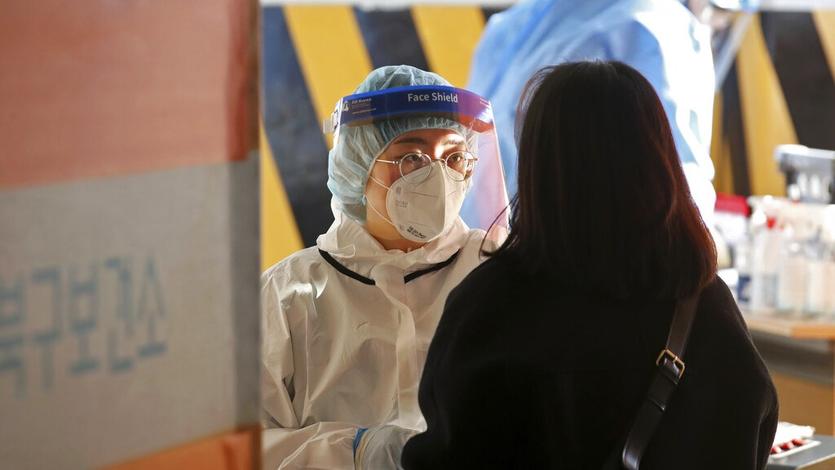 A medical worker wearing protective gear takes a sample from a woman at a temporary screening clinic for the coronavirus in Gwangju, South Korea, on Jan 3, 2022. (JO NAM-SU / YONHAP VIA AP)
A medical worker wearing protective gear takes a sample from a woman at a temporary screening clinic for the coronavirus in Gwangju, South Korea, on Jan 3, 2022. (JO NAM-SU / YONHAP VIA AP)
South Korea
South Korea on Friday decided to extend the tightened social-distancing rules for three more weeks to tackle the spread of the Omicron COVID-19 variant.
South Korean Prime Minister Kim Boo-kyum told the COVID-19 response meeting that the Omicron spread gained speed two weeks ahead of the Lunar New Year holidays that continue from Jan 31 to Feb 2 this year.
The toughened social-distancing guideline will be maintained until Feb 6, according to the Ministry of Health and Welfare.
Under the guideline, the maximum number of people allowed for private gatherings will be raised from four to six nationwide, but the business hour curfew will be put in place among multi-use facilities.
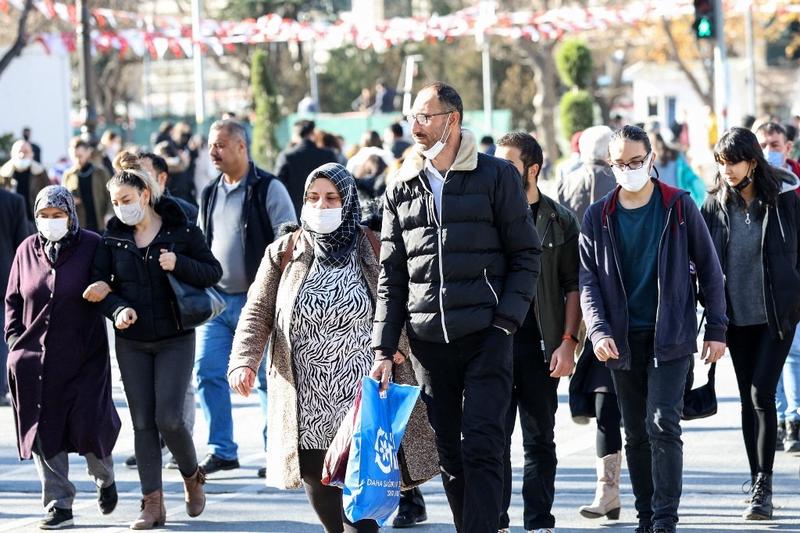 Pedestrians wearing face masks walk on a street in Ankara, Turkey on Dec 12, 2021, amid the COVID-19 pandemic. (ADEM ALTAN / AFP)
Pedestrians wearing face masks walk on a street in Ankara, Turkey on Dec 12, 2021, amid the COVID-19 pandemic. (ADEM ALTAN / AFP)
Turkey
Turkey on Thursday reported 75,564 new COVID-19 cases, raising its tally of infections to 10,271,240, according to its health ministry.
The death toll from the virus in Turkey rose by 153 to 84,278, while 51,675 more people recovered in the last 24 hours.


